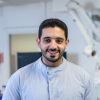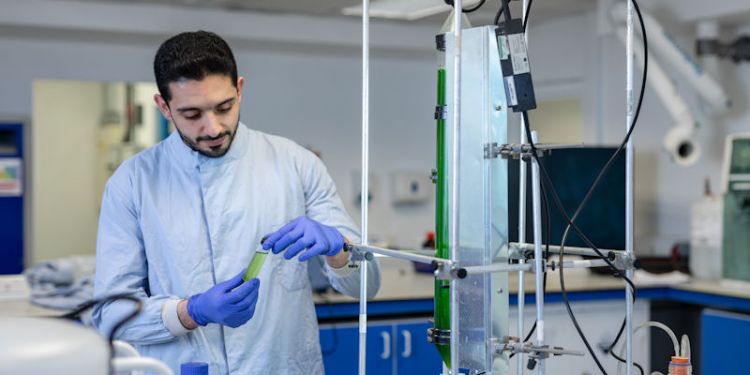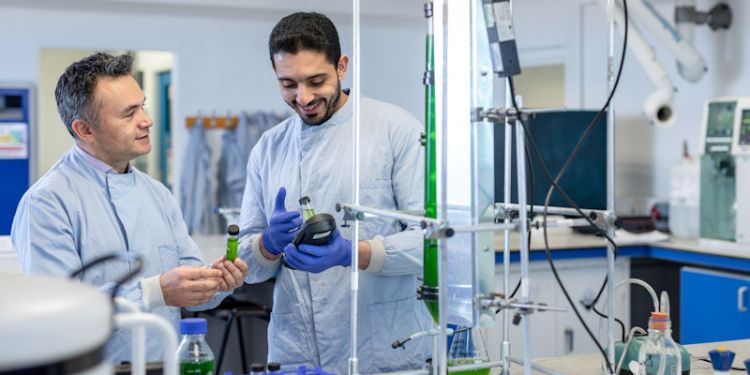
Saleh Al Haddad
- Course: PhD in Civil engineering
- PhD title: Integration and optimization of dark fermentation with anaerobic digestion for increasing methane yield from sewage sludge
Saleh Al Haddad is a postgraduate researcher in the Bioresource Systems research group, within Civil Engineering. His PhD was funded by his employer, Kuwait Institute for Scientific Researchers, Kuwait, where Saleh worked as a Research Assistant in a water research center. The company offers consulting services for wastewater projects including treatments, developments and innovation.
Improving wastewater treatment
Saleh, who is supervised by Dr Miller Alonso Camargo-Valero, Dr Louise Fletcher and Dr Andrew Ross, conducts research that has potential applications in the waste industry. The overall aim of his research is to investigate and assess the levels of methane produced in ‘anaerobic digestion,’ a process that takes place in the digestion of sewage sludge for environmentally friendly outcomes.
Saleh said: “The benefit is to know the amount of methane inside the produced biogas from an anerobic digestion reactor, so that we can upgrade the reactor in way to increase the amount of methane in the biogas. This will help to reduce the amount of carbon dioxide release and increase the energy, meaning it is more energy-efficient and environmentally friendly.”

Saleh's research will help to produce energy-efficient processes
Saleh hopes to achieve his research objectives by optimising the ‘hydrotropic-methanogenesis’ pathway. “This pathway is the last biochemical process in the reactor where the hydrogen is consumed, and transferred to methane and CO2 as final biogas products,” Saleh said.
“I will try to increase the amount of hydrogen at this stage by using biological hydrogen production instead of other energy and costly methods. The more hydrogen that can be transferred in the system, the more methane can be produced. In turn this leads to high methane content in the biogas, resulting in more energy.”
Laboratory-based research
For the most part, Saleh explained, his research involves conducting experiments in the lab. He said:
“I am studying the potential of ‘dark fermentation technology,’ which is a process that encourages fermentative bacteria to hydrolyse organic substrates to produce energy carriers such as hydrogen gas and formate. The purpose of my research is to assess the potential of integrating ‘dark fermentation’ with ‘anaerobic digestion’ systems, to increase methane yield in biogas composition in wastewater treatment works.”
The purpose of my research is to... increase methane yield in biogas composition in wastewater treatment works.
Saleh continued: “I am producing a high biogas quality to use in combined heat engine, as the process produces heat and electricity. This biogas has potential to be inserted into the gas grid directly, and as a result will decrease the amount of CO2, minimizing the impact on our environment.
“I am doing this by testing greater levels of hydrogen production in the lab, which could have potential applications, such as using hydrogen directly as an energy source or for upgrading the produce biogas in the exist anaerobic digestion reactors in the waste industry.”
...as a result it will decrease the amount of CO2, minimising the impact on our environment.
Biogas is an excellent substitution of conventional fuels and one of the main bioenergy sources, Saleh explained. The typical anaerobic digestion (AD) process produces biogas that contains by volume 50−70% CH4 and 30−50% CO2 . Increasing the methane amount in biogas content will enable biogas to be transported to the natural gas grid. Saleh explained his study investigates how to enhance methane yields to have a low CO2 concentration from an AD reactor in wastewater treatment, when processing sewage sludge.
Supportive community
Being part of a supportive and active community of researchers has enhanced Saleh’s time at Leeds, he explained.
“The Bioresource Systems research group is very supportive. Being part of this setting has supported me in achieving my research objectives and find new findings toward enhancing our environment,” said Saleh.
“In the future, I aspire to work as scientific researcher, and perhaps lecturer in universities or colleges. I would like to work in Kuwait as a scientific researcher, but I believe it is very important to have big network of people in the same area of my research. Also it is important to share the knowledge and the achievements with others by attending conferences, publishing journal articles, participating in workshops, giving lectures and training courses.”
I believe it is very important to have a network of people in the same area of my research... and to share the knowledge and the achievements with others.

Being part of a supportive community has encouraged Saleh to achieve his research objectives
Living in Leeds
Saleh chose to study at Leeds due to its excellent reputation and the lively atmosphere of the city. He said:
“Leeds is one of the best universities in the UK. The city itself is a fantastic place to live as there is an abundance of activities to take part in during your spare time. I would recommend Leeds both as a place to carry out research and enjoy being part of vibrant community.”

